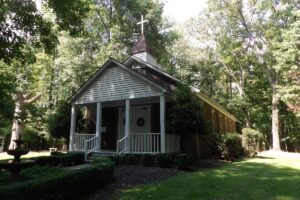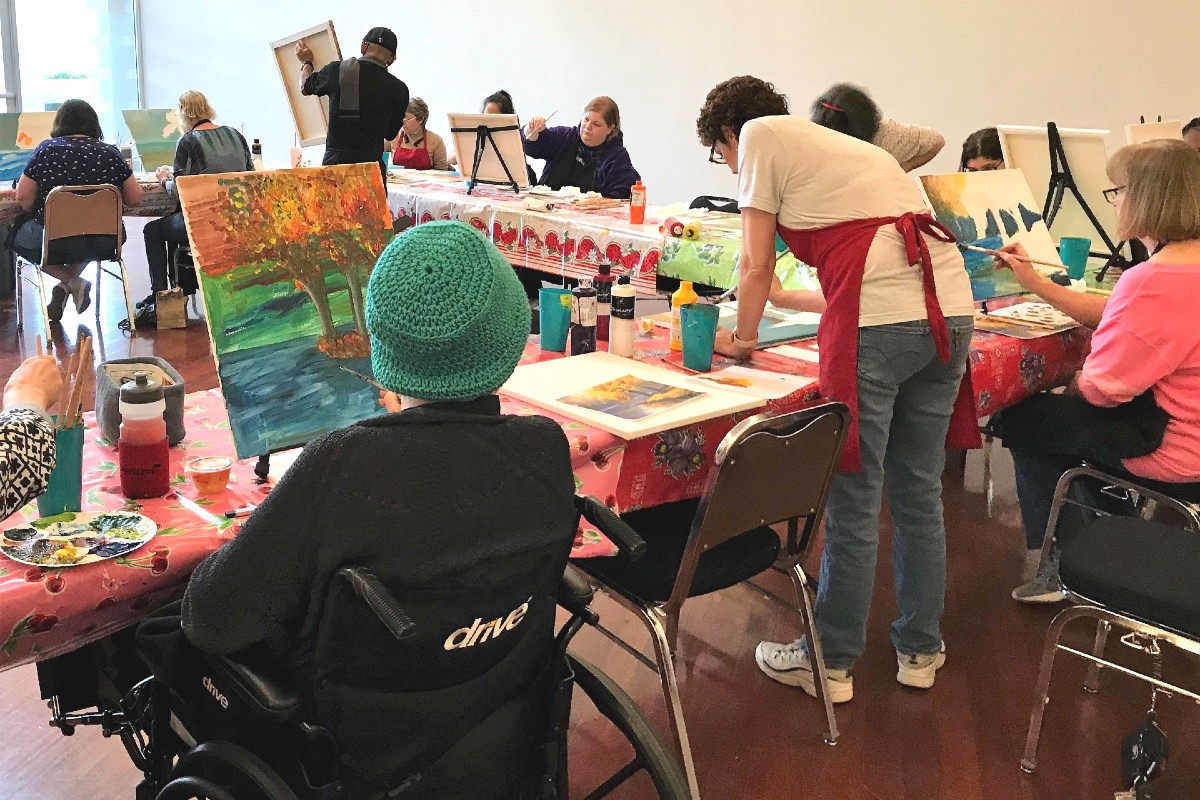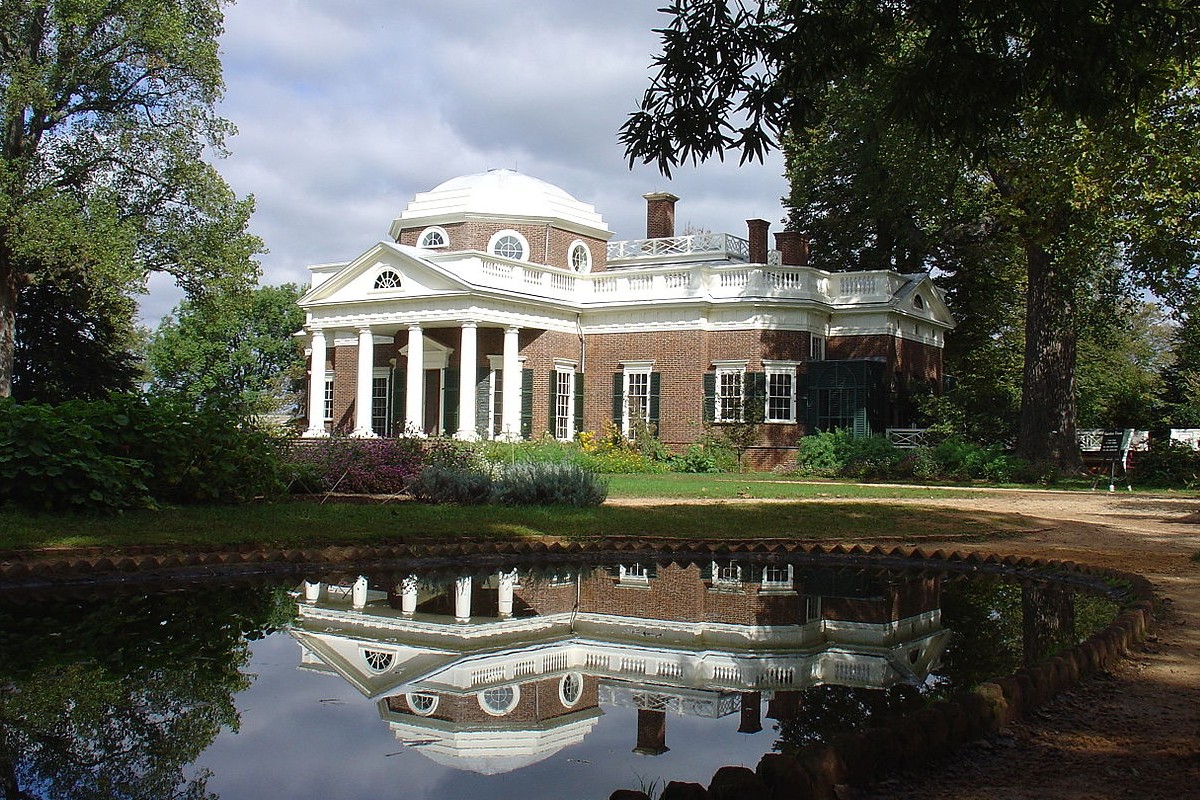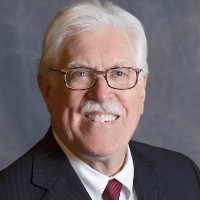GwinnettForum | Number 22.08 | Jan. 27, 2023
ART ACTIVITY: Almost every day, there is art activity at the Hudgens Center for the Arts and Learning in Duluth at the Gas South District. The Center offers hands-on, imagination-driven classes for adults and kids. Choose from pottery, painting, drawing, and hand-crafted goods for gifting today. Go to https://thehudgens.org for more details.
TODAY’S FOCUS: A glance at religious freedom and the fate of Monticello
EEB PERSPECTIVE: Azaleas may have survived freezing temps; be patient ‘til spring
SPOTLIGHT: Law Office of J. Michael Levengood, LLC
FEEDBACK: Wonders if something fishy going on about classified documents
UPCOMING: Duluth Municipal Court launches citation amnesty program
NOTABLE: Sahara Peters named top student doctor at PCOM
RECOMMENDED: Lessons in Chemistry by Bonnie Garmus
GEORGIA TIDBIT: Hugh Peterson Sr. was Congressman from the First District
MYSTERY PHOTO: Check the handsome, classical design of today’s Mystery
CALENDAR: Gwinnett Stripers host a Job Fair on January 28 at Coolray Field
A glance at religious freedom and the fate of Monticello
By John Titus
PEACHTREE CORNERS, Ga. | One of the three achievements for which Thomas Jefferson wanted to be remembered was as the author of the Virginia Statute for Religious Freedom. Although he initially wrote it in 1777, it ultimately did not pass the Virginia legislature until 1786. The statute disestablished the Church of England in Virginia and guaranteed freedom of religion to people of all religious faiths including Christians of all denominations, Jews, Muslims, and Hindus. It was a precursor for the establishment and free exercise clause in the First Amendment to our Constitution.
Fast forward 40 years to the death of Thomas Jefferson in 1826. Jeff Randolph, Jefferson’s grandson, was the executor of the estate and found that it had debts of $100,000 [more than $3 million today]. The family decided to sell everything except the physical structure and some surrounding land. But by 1828, he agreed to sell the house. He hoped it would attract an offer of about $10,000.
Finally in 1831, James Turner Barclay, a Charlottesville pharmacist, offered $4,500 and a home in Charlottesville, for Monticello and 552 surrounding acres. The Barclays moved in and had plans, but they soon foundered, in part because of the continuing hordes of tourists. By October 1833, the Barclays put the house back on the market.
Uriah P. Levy, a Philadelphia-born Jewish lieutenant in the U.S. Navy, who greatly admired Jefferson for his efforts on behalf of religious freedom, visited the house on April 5, 1834, made an offer of $2,700 for the house and 218 surrounding acres. The deal was finalized on May 20, 1836. As his naval career allowed, he visited and spent a month or more annually at Monticello and spent thousands of dollars rehabilitating the home. Toward the end of 1858 Levy drew up a will proposing to bequeath it to the U.S., but Congress did not know how the Constitution could allow the government to accept it or pay for renovation.
At the start of the Civil War the Confederate States of America seized it on the grounds that an officer of the U.S. Navy owned it. The Levy estate regained it in 1873. The house had deteriorated by that time.
Uriah Levy’s nephew, aptly named Jefferson Monroe Levy, stepped in to rescue the home. Over time he bought out the other members of the family and became the sole owner. He had the interest and resources to return it to its former glory. We can credit him with saving Monticello. Eventually, he found it necessary to sell. In 1923 the newly formed Thomas Jefferson Memorial Foundation raised funds to purchase Monticello from Jefferson Monroe Levy for $500,000. That is roughly $8,250,000 in 2023. This information comes from TJ Foundation and an inflation calculator website.
The Foundation’s initial focus was on architectural preservation, with the goal of restoring Monticello as close to its original appearance as possible. It has since grown to include other historic and cultural pursuits and programs such as its Annual Independence Day Celebration and Naturalization Ceremony. It also publishes and provides a center for scholarship on Jefferson and his era.
That’s why Monticello is restored and open to the public today.
Azaleas may have survived freezing temps; be patient ‘til spring
By Elliott Brack
Editor and Publisher, GwinnettForum
JAN. 27, 2023 | Remember those long days of below freezing temperature in Atlanta in December?
![]() Bet it played havoc with your outdoor plants and bushes. It sure did mine.
Bet it played havoc with your outdoor plants and bushes. It sure did mine.
What looks particularly bad in our yard are the azalea bushes. Before the heavy freeze, their leaves were healthy-looking and green. But after the freezing hit them, their leaves first turned brown, and lately many have been shed.
The bushes look like they might have to be replaced, and these are big, 50 year old plants which bloom beautifully each spring, and then we cut them back slightly.
Other bushes around our lot have also been hit hard, though the azaleas are all over our yard, and show the heavy signs of the cold weather.
What to do?
We went to an expert, Tim Daly, who for 16 years was the University of Georgia Extension Agent in Gwinnett, and now holds a similar post in Henry County. (However, he still lives in the southern part of Gwinnett.)
Tim says: “Most of the azaleas in this part of the state are pretty cold tolerant and will survive. Most of them will probably leaf out in the spring. My own azalea bushes handled the cold pretty well. For sure, don’t start trimming them back until spring, and then you probably will see them bloom out well. You always cut azaleas after they bloom.”
Tim says that one bush variety that doesn’t handle cold well are the hydrangeas. “They may suffer some damage. However, bush plants in your yard have their roots in the ground, and may surprise you at how hearty they are. Wait for them to leaf out in the spring.”
Tim’s right about one thing: the hydrangeas we have seen look mighty puny these days, with their leaves almost crumbling. They usually start leafing out before azaleas, so they could be a harbinger of how serious the damage was to our plans from the prolonged freeze.
Now in general, here are some ways other plants were impacted: Kim Fritz of the Gwinnett UGA Extension office gives some ways that many other outdoor plants were impacted:
- Pansies, commonly planted in large masses, such as the square in Lawrenceville, suffered damage, but most will recover. Remove dead leaves and flowers and apply fertilizer.
- Container gardens and raised planters may have sustained the most damage. After all, being that they are above ground, their root systems were more exposed and stayed frozen for longer. Keep them watered.
- Most trees and shrubs adapted to our area should be all right. See how they leaf out in the spring.
- Cool season garden plants, such as cabbage, collards, turnips, and arugula, were hit hard and many perished. Those that survived may be all right. Ensure they receive adequate water and fertilizer.
- Our lawns should be fine. Exceptions may be ones that are composed of centipede grass and St. Augustine grass. Observe how they green up in the spring to determine if any damage has occurred.
So, in general, be patient, and for sure, don’t get out the clippers yet! Give Mother Nature a chance! She’s a mighty dependable dame.
GERRYMANDERING: This cartoon is perhaps the best we’ve seen in explaining how gerrymandering works. It’s from the South Carolina cartoonist Robert Ariail of Camden, S.C., and first appeared in the Charleston, (S.C.) City Paper, which gave us permission to run. Isn’t this great?
- Have a comment? Send to: elliott@brack.net
Law Office of J. Michael Levengood, LLC
 The public spiritedness of our underwriters allows us to bring GwinnettForum.com to you at no cost to readers. Today’s underwriter is the Law Office of J. Michael Levengood, LLC. Before relocating his general civil practice eight years ago to Lawrenceville, Mike Levengood practiced law as a partner in an Atlanta firm for almost 34 years, handling a wide variety of commercial and litigation matters for business clients. Mike is a community leader in Gwinnett County where he serves on several non-profit boards.
The public spiritedness of our underwriters allows us to bring GwinnettForum.com to you at no cost to readers. Today’s underwriter is the Law Office of J. Michael Levengood, LLC. Before relocating his general civil practice eight years ago to Lawrenceville, Mike Levengood practiced law as a partner in an Atlanta firm for almost 34 years, handling a wide variety of commercial and litigation matters for business clients. Mike is a community leader in Gwinnett County where he serves on several non-profit boards.
- Visit this supporter’s web site at https://www.levengoodlaw.com
- For a list of other sponsors of this forum, click here
Wonders if something fishy going on about classified documents
Editor, the Forum:
![]() There is something fishy about all of these classified documents showing up all over the place. Look at President Biden alone. They have searched his house on several occasions and they have found additional documents each time. Not very good at searching, are they?
There is something fishy about all of these classified documents showing up all over the place. Look at President Biden alone. They have searched his house on several occasions and they have found additional documents each time. Not very good at searching, are they?
I think that the documents in both Biden’s and Michael Pence’s houses are plants. Now who would do something like that? I think either Trump or his cohorts would do something like that.
Why would he do that? He wants to embarrass both of them, Biden, most of all, because he might be running against him and basically Pence for the same reason. He would do this also because he is charged and this might just push his case away.
– Raleigh Perry, Buford
GwinnettForum welcomes letters of comment, praise or criticism
Editor, the Forum:
While I agree with almost all the accusations in the article about Congress and its divide. You may get some severe criticism from the right for it. Good Luck
–Mike Eberlein, Peachtree Corners
Dear Mike: We will always invite our readers to write a letter to the editor if they feel a comment needs it. –eeb
Send us your thoughts: We encourage you to send us your letters and thoughts on issues raised in GwinnettForum. Please limit comments to 300 words, and include your hometown. The views of letters are the opinion of the contributor. We reserve the right to edit for clarity and length. Send feedback and letters to: elliott@brack.net.
Duluth Municipal Court launches citation amnesty program
The City of Municipal Court has launched a Citation Amnesty Program. The Court is offering this first-time program to address the need to close pending cases with outstanding failure to appear (FTA) warrants.
The program invites those with FTA warrants to contact the Court to pay outstanding fines or schedule a court appearance before a judge to dispose of their case. No late fees would be imposed in these cases and payment plans will be available for cases that are heard in court.
Chief Judge Charles L. Barrett, III comments: “People have begun to take advantage of the program and we anticipate a positive response during the program’s duration.”
If you have an outstanding failure to appear warrant, license suspension or late fee from the City of Duluth, you are encouraged to take advantage of the amnesty program. This program runs now through April 30, 2023.
Citizen questions about the Amnesty Program can be directed to the Duluth Municipal Court at amnesty@duluthga.net or by calling 880-623-2771.
Hudgens Center, Holtkamp renew free admission agreement
 The Hudgens Center for Art and Learning announced a renewal of a five-year strategic partnership with Holtkamp Heating and Air of Suwanee. In addition to sponsoring free admission to the galleries for the next five years, the Holtkamp team also serviced all of the facility’s HVAC systems and maintained 18 smart thermostats at no charge to maximize energy efficiency.
The Hudgens Center for Art and Learning announced a renewal of a five-year strategic partnership with Holtkamp Heating and Air of Suwanee. In addition to sponsoring free admission to the galleries for the next five years, the Holtkamp team also serviced all of the facility’s HVAC systems and maintained 18 smart thermostats at no charge to maximize energy efficiency.
Through a combination of donated services, significant energy savings, private gifts and free admission, the Holtkamp’s support represents close to $250,000 in the first five years of partnership.
According to Hudgens Center Executive Director Laura Ballance, “Holtkamp Heating and Air has been a great friend and supporter of the Hudgens for the past five years. Thanks to their partnership, admission is free to visitors of the Hudgens’ five galleries, our Sculpture Garden and the interactive Children’s Art Zone, allowing us to serve as an inspiring, enriching resource, accessible to all in our community. With approximately 8,500 gallery visitors annually, we have seen a tremendously positive impact on the growth and reach of the arts in our community thanks to their generosity.”
Commissioners approve funding for three projects
Gwinnett’s Board of Commissioners gave the greenlight to several county initiatives. And it’s all funded by SPLOST. Here are some highlights:
- ADA bleachers at Shorty Howell Park: To remain inclusive and diverse, the county will install new bleachers with elevated and accessible seating and ramps at the Shorty Howell Park multi-purpose field. The old bleachers will be demolished. The cost of the project is $235,000 and is funded by the 2014 SPLOST program.
- Bay Creek Park to get new playground: It’s been nearly 20 years since the playground at Bay Creek Park was built, now faithful parkgoers will soon see major upgrades. The play area will include an obstacle course and circular ramp system to name a few improvements. The equipment will cost $979,443 and is funded by the 2017 SPLOST.
- Mobility upgrades funded by SPLOST: To encourage pedestrian safety, James Road at U.S. Highway 29 will get new sidewalks. The upgrade also includes curb, gutter and drainage improvements. Various SPLOST programs will foot the bill at a cost of $1,047,467.
Peters named top student doctor at PCOM
Sahara Peters was recently named the PCOM Georgia “student doctor of osteopathic medicine of the Year” by a committee made up of students and faculty members. Her name will be submitted for national honors. She is from Panama City, Fla.
A third year student doctor, Peters has exhibited this commitment since she first stepped onto the campus of PCOM Georgia in the midst of the COVID pandemic. Peters is well known on the campus for her contributions to the osteopathic medicine program, its students and the profession. During her second year, she served as the DO Council secretary and coordinated the TOUCH system, which tracks student volunteer hours. To orient new DO students to campus, she helped establish a mentorship system between first and second year students, and coordinated multiple student encouragement events that took place on-campus, off-campus and virtually.
She also hosted a Google Meets virtual study hall, where students were able to log onto the study link, while keeping their mics on mute so they could “study together.” More than 40 classmates logged on regularly to the study link. Fittingly, when superlative awards were given, Peters and her classmate Rachel Rabaioli-Brosius were recognized as “Class Parents.”
During her time at Davidson College, Peters was named the 2013 Davidson College Outstanding Community Service Award recipient.
EMC Foundation awards $33,000 to Gwinnett nonprofits
The Jackson EMC Foundation board of directors awarded a total of $82,500 in grants for organizations during its December meeting, including $33,000 to organizations serving Gwinnett County.
- $15,000 to Salvation Army—Gwinnett, for its Financial Emergency Services Program, which provides rent and mortgage assistance to Gwinnett County residents in need to prevent homelessness and stabilize families in crises.
- $10,000 to Eyes of Love Lighthouse Mission, Inc., a Buford-based grassroots ministry that collects and distributes clothes, food and furniture to needy families in Barrow, Gwinnett and Hall counties, to help with rent on the building housing the mission’s inventory.
- $8,000 to South Enotah Child Advocacy Center, Inc., for its trauma-focused therapy for child abuse victims in Banks, Gwinnett, Hall, Jackson and Lumpkin counties.
- Have a comment? Send to: elliott@brack.net
Lessons in Chemistry by Bonnie Garmus
![]() From Susan McBrayer, Sugar Hill: Girls in science? Never! It was the 1960s. The science industry was particularly rife with severe and massive gender bias. So when Elizabeth Zott tries to forge a career in chemistry during this unenlightened period, she is ignored, abused, ridiculed, stolen from, lied to and not taken at all seriously. Fortunately, Elizabeth has a brain, guts and determination. That doesn’t help her while she’s in college where she was discriminated against and even raped by a professor. But it does help her when she’s cast in a TV cooking show which she immediately turns into a chemistry lesson to empower women. Despite the story’s painful beginning, it is witty and smart and uplifting. And at the end, you may want to shout, ‘Hooray!’ Every woman under 50 should read this to understand how things used to be. I think every man should read it, too, but that probably won’t happen.
From Susan McBrayer, Sugar Hill: Girls in science? Never! It was the 1960s. The science industry was particularly rife with severe and massive gender bias. So when Elizabeth Zott tries to forge a career in chemistry during this unenlightened period, she is ignored, abused, ridiculed, stolen from, lied to and not taken at all seriously. Fortunately, Elizabeth has a brain, guts and determination. That doesn’t help her while she’s in college where she was discriminated against and even raped by a professor. But it does help her when she’s cast in a TV cooking show which she immediately turns into a chemistry lesson to empower women. Despite the story’s painful beginning, it is witty and smart and uplifting. And at the end, you may want to shout, ‘Hooray!’ Every woman under 50 should read this to understand how things used to be. I think every man should read it, too, but that probably won’t happen.
An invitation: what books, restaurants, movies or web sites have you enjoyed recently? Send us your recent selection, along with a short paragraph (150 words) as to why you liked this, plus what you plan to visit or read next. Send to: elliott@brack.net
Peterson was congressman from the First District
Hugh Peterson Sr., a native of Ailey, in Montgomery County, served in the Georgia General Assembly from 1923 to 1933. Along with Georgia governor Richard B. Russell Jr., Peterson was instrumental to the passage of the State Reorganization Act of 1931, which streamlined the workings of state government. He later served in the U.S. Congress from 1935 to 1947.
 Peterson was born in Ailey on August 21, 1898, to Joanna Calhoun and William J. Peterson. He graduated in 1916 from Brewton-Parker Institute and in 1917 from the University of Georgia in Athens. Peterson enlisted in the U.S. Army and entered the U.S. Military Academy at West Point, New York, in October 1918.
Peterson was born in Ailey on August 21, 1898, to Joanna Calhoun and William J. Peterson. He graduated in 1916 from Brewton-Parker Institute and in 1917 from the University of Georgia in Athens. Peterson enlisted in the U.S. Army and entered the U.S. Military Academy at West Point, New York, in October 1918.
He remained in the military until honorably discharged at the end of World War I (1917-18). After the war, Peterson returned to Ailey and established an insurance agency in 1919, while also managing his family farm holdings and studying law under a private course. In 1921 he was admitted to the Georgia Bar Association and elected mayor of Ailey, serving from 1922 to 1923.
In 1922 Peterson won a seat in the Georgia House of Representatives as the representative of Montgomery County. He continued his insurance and farming enterprises while in office and in 1924 established the Monitor Publishing Company, serving as president of the company and editor of the Montgomery Monitor into the 1950s. He also became close friends with other young legislators from around the state, including Roy V. Harris and Richard B. Russell Jr. In late 1929 Peterson met Russell’s sister Patience Elizabeth Russell, whom he married on June 24, 1930. The couple had one child, Hugh Peterson Jr., who became an attorney in Atlanta.
Peterson’s high level of involvement with fellow legislators, committees, and state agencies allowed him to contribute to Georgia governor Lamartine Hardman’s plan in 1928-29 to reorganize the state government. In 1930 Peterson ran for a seat in the state senate, and Russell, his new brother-in-law, ran for governor. Both won their respective elections. Russell named Peterson chair of a special legislative committee, which held hearings and created the State Reorganization Act of 1931. This act included the consolidation of more than 100 state departments into 18, as well as the creation of the University System of Georgia. Russell signed the act into law on August 28, 1931.
In 1934 Peterson won a seat in the U.S. Congress representing Georgia’s First Congressional District. As a congressman, Peterson focused on farm legislation and committee work on public lands and highways. He remained in office until 1946. In 1946 Prince Preston of Statesboro, a returning World War II (1941-45) veteran and former state legislator, ran against Peterson for the congressional seat and won.
From 1946 until his death in 1961, Peterson worked as a lobbyist for the American Turpentine Farmers’ Association, Georgia Power Company, and the United States Cane Refiners Association. While researching development around Sylva, N.C., Peterson died there of a cerebral hemorrhage on October 3, 1961. He was buried in Ailey at the Peterson family cemetery. His papers are housed at the Richard B. Russell Library for Political Research and Studies at the University of Georgia.
- To view the Georgia Encyclopedia article online, go to https://www.georgiaencyclopedia.org
Check the handsome, classical design of today’s mystery
Here’s a handsome photo of a classical design. Many of our readers may have seen it. Can you figure out what it is, and where it is located? Send your answers to elliott@brack.net and be sure to tell us the hometown where you live.
 From the last edition and its mystery, Cathy Loew, Peachtree Corners, wrote: “Another deja vu moment! I’ve attended a wedding there too!” She identified the chapel at Simpsonwood Park in Peachtree Corners. The photo was made by George Graf of Palmyra, Va.
From the last edition and its mystery, Cathy Loew, Peachtree Corners, wrote: “Another deja vu moment! I’ve attended a wedding there too!” She identified the chapel at Simpsonwood Park in Peachtree Corners. The photo was made by George Graf of Palmyra, Va.
Allan Peel, San Antonio, Tex. wrote: “Today’s mystery photo is the Chapel at Simpsonwood Park, more formerly called the Elizabeth Jane Sanders Simpson Chapel.
“Simpsonwood Park is named after its donor, Anna Louise ‘Ludie’ Simpson (1887-1975), who bequeathed the 227-acres of pristine land with 2,040 foot frontage on the Chattahoochee River to the Methodist church in 1973 with the understanding that it would not be subdivided or developed. Once it was taken over by UMC, it was converted into a conference center and called the ‘North Georgia Conference of the United Methodist Church.’ The Methodists kept to their word and maintained the property intact with minimal development. Furthermore, based on an agreement made to Simpson prior to her death, the UMC built the 100-seat chapel in 1985, and named it after, and in honor of, Ludie Simpson’s mother, Elizabeth Jane Sanders Simpson (1851 — 1931).
Sadly, the UMC were unable to maintain the property, and was purchased by Gwinnett County with help from the City of Peachtree Corners in 2016 so that the wishes of Ludie Simpson could be continued to be honored. The county’s goal for the park is to maintain it as a nature preserve with minimal improvements. The conference lodge has since been demolished and only the small chapel remains and operates as a popular wedding venue.”
Others recognizing the photo include Christina Howell-Scott, Peachtree Corners; Jay Altman, Columbia, S.C.; Stew Ogilvie, Lawrenceville; and Lou Camerio, Lilburn.
![]() JOB FAIR: The Gwinnett Stripers will host a Job Fair at Coolray Field on Saturday, January 28 from 10 a.m. to 2 p.m. The event will take place in the Suite Lounge. A large variety of jobs are open from ushers, to security, tickets sellers, grounds crew and photographers. Applicants for all positions should bring printed copies of their resume. Parking is free, and attendees will enter through the Coolray Field Main Gate. Applicants may also apply online at GoStripers.com/jobs.
JOB FAIR: The Gwinnett Stripers will host a Job Fair at Coolray Field on Saturday, January 28 from 10 a.m. to 2 p.m. The event will take place in the Suite Lounge. A large variety of jobs are open from ushers, to security, tickets sellers, grounds crew and photographers. Applicants for all positions should bring printed copies of their resume. Parking is free, and attendees will enter through the Coolray Field Main Gate. Applicants may also apply online at GoStripers.com/jobs.
Stakeholder input session: The Town of Braselton has partnered with Downtown Strategies for a Strategic Visioning Workshop and Strategic Plan for moving Downtown Braselton forward. Citizen input is needed! Plan to attend the session and come prepared to collaboratively share ideas, goals, concerns, and challenges. The session will be held February 9, from 11:30 a.m. until 1 p.m. at the Braselton Civic Center, 27 East Lake Drive.
Men’s Civic Breakfast at Christ Episcopal Church in Norcross will be February 11 at 8 a.m. in Webster Hall. Speaker will be Gwinnett Sheriff Keybo Taylor. The church is located at 400 Holcomb Bridge Road in Norcross.
GwinnettForum is provided to you at no charge every Tuesday and Friday.
Meet our team
- Editor and publisher: Elliott Brack, 770-840-1003
- Managing editor: Betsy Brack
- Roving photographer: Frank Sharp
- Contributing columnist: Jack Bernard
- Contributing columnist: George Wilson
More
- Mailing address: P.O. Box 1365, Norcross, Ga. 30091
- Work with us: If you would like to learn about how to be an underwriter to support the publication of GwinnettForum as a community resource for news and commentary, please contact us today.
Subscriptions to GwinnettForum are free.
- Click to subscribe.
- Unsubscribe. We hope you’ll keep receiving the great news and information from GwinnettForum, but if you need to unsubscribe, go to this page and unsubscribe in the appropriate box.
© 2023, Gwinnett Forum.com. Gwinnett Forum is an online community commentary for exploring pragmatic and sensible social, political and economic approaches to improve life in Gwinnett County, Ga. USA.


















Follow Us